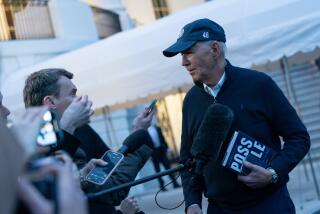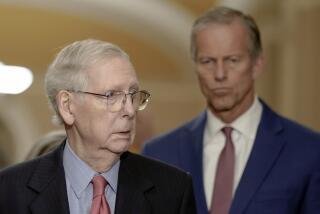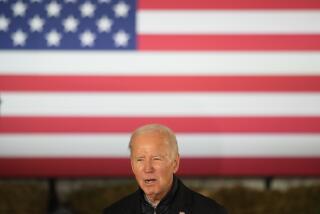Gingrich hits bumps in presidential campaign
By the time Newt Gingrich got here, his first week as an official presidential candidate had been a doozy. He’d been skewered by members of his own party after disparaging the budget plan of Wisconsin Rep. Paul D. Ryan; branded an “embarrassment” by a GOP voter in a videotaped confrontation that went viral; and showered with confetti at a Minnesota book signing.
But in spite of those “bumps,” as the former House speaker called them, nearly 100 people filtered in to hear him speak at an early-morning event, giving the 2012 Republican hopeful some bragging rights after what he described as “a little bit of a challenging week.”
As the crowds grew at each subsequent venue Thursday, from a brewery in Ames to a winery in Carroll, he asked the converted to appear in a video to explain their support for his calls for deregulation and lower taxes, in order to prove to “doubters that this campaign is very alive.”
Gingrich’s prickly defiance last week was a marked change from his sunny mood after he announced his candidacy, when he declared, “I think this is going to be the happiest, most positive, most fun campaign in my lifetime.”
In recent weeks, he has made conflicting and controversial statements about his views on healthcare and intervention in Libya, but the biggest firestorm followed the criticism of Ryan’s proposal to privatize Medicare for future seniors. Gingrich described the plan as radical “right-wing social engineering.”
The candidate’s missteps have wounded his nascent bid, political observers said, if not yet fatally.
“He still has tremendous name recognition, but he’s very much in damage-control mode,” said Dennis Goldford, a political science professor at Drake University in Des Moines. “He’s a bright guy. The question is whether [voters] think he’s a bright guy who just too often says the wrong things and gets himself into trouble.”
Gingrich has notable strengths — star power stemming from his role in seizing control of the House in 1994, the first time in 40 years that Republicans had done so, and an extensive network of supporters built during his two decades in Congress.
But many Americans remember him for other turns in that era: the federal government shutdown and cheating on his wife at the same time he pressed the infidelity-related impeachment of President Clinton.
Gingrich’s criticism of Ryan’s plan — which drew fire from such conservative stalwarts as talk show host Rush Limbaugh — dogged him throughout his 17-city, five-day Iowa tour. He was repeatedly pressed by reporters about whether his campaign could recover.
“If you’re the candidate of really dramatic change, of really new ideas, you have to assume that there’s a certain amount of clutter and confusion and that it takes a while to sort it out because you’re doing something really, really different,” he said.
But GOP strategists, some Iowa voters and even a former Gingrich aide said that the flap over Medicare underscored his greatest vulnerability — his mouth can get ahead of his brain.
Rich Galen, a former Gingrich advisor who is unaligned in the presidential contest, said when he worked for the then-congressman, Gingrich would unleash a torrent of ideas daily.
“Twelve would be benign, two would be brilliant, one would be deadly,” he said. “I don’t think that is a trait people are comfortable with in the president of the United States.”
In Iowa, Gingrich sought to focus on policy and cast himself as the sole GOP candidate with the experience to succeed in Washington. He repeatedly alluded to working with President Reagan and reeled off accomplishments from his heyday in the 1990s: tax cuts, a balanced budget and welfare reform — “the biggest entitlement reform of your lifetime.”
When he was challenged by a voter who noted that he is a career politician, Gingrich replied with an attack on President Obama.
“Do I know a fair amount about Washington — you betcha,” he replied. “To paraphrase Ronald Reagan: We just tried youth and inexperience. It’s been a very expensive experiment.”
He began each speech calling for the repeal of “Obamacare” and said he would support early legislation that would allow all Americans to apply for a waiver to the plan’s requirement that they be covered by health insurance.
But he also offered up new grist for conservative critics. When a voter asked about immigration, Gingrich said the government should think carefully about how to handle the nation’s 11 million illegal immigrants.
At the risk of “getting in trouble,” he said, he was contemplating a proposal modeled on the draft, in which an elected local board would make decisions about who was conscripted.
“We are going to want to find some way to deal with the people who are here, to distinguish between those who have no natural ties to the United States — and therefore you could deport them at minimum human cost — and those who in fact may have earned the right to become legal but not citizens,” he said, running counter to existing GOP policy.
Political experts said appeals to early-state voters are vital, especially given the gale of criticism that has buffeted Gingrich.
“Even if he does a few interviews where he comes off as a loose cannon in the national media, for Iowa voters, the key will be that he still has small group meetings and is out shaking hands,” said Christopher Larimer, a political science professor at the University of Northern Iowa.
It made the difference for Marcia Ziel, a 70-year-old Marshalltown resident who went to see Gingrich at the local library. She walked into the event concerned about Gingrich’s gaffes, yet emerged committed to him.
“He has the knowledge; he’s had the experience; his ideas are right on,” Ziel said.
Mac Peterson, 71, was hesitant about Gingrich — and more likely to side with another candidate — after attending the brewery event.
“His mind is like a chess game: He’s four or five steps ahead. But his mouth is four or five moves behind,” said the former Ames restaurateur.
Gingrich could face another trial Sunday when he appears on CBS’ “Face the Nation” — a move that Doug Gross, a prominent GOP activist in Des Moines who is undecided in the race, described as foolish.
“It’s crucial for him that he not spend the next two weeks apologizing for something he said the day before,” Gross said.
Mehta reported from Los Angeles and Reston from Iowa.
More to Read
Start your day right
Sign up for Essential California for news, features and recommendations from the L.A. Times and beyond in your inbox six days a week.
You may occasionally receive promotional content from the Los Angeles Times.








